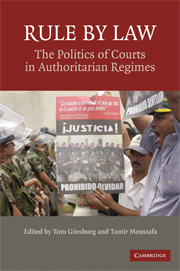Book contents
- Frontmatter
- Contents
- Contributors
- Introduction: The Functions of Courts in Authoritarian Politics
- 1 Of Judges and Generals: Security Courts under Authoritarian Regimes in Argentina, Brazil, and Chile
- 2 Administrative Law and the Judicial Control of Agents in Authoritarian Regimes
- 3 Singapore: The Exception That Proves Rules Matter
- 4 Agents of Anti-Politics: Courts in Pinochet's Chile
- 5 Law and Resistance in Authoritarian States: The Judicialization of Politics in Egypt
- 6 Courts Out of Context: Authoritarian Sources of Judicial Failure in Chile (1973–1990) and Argentina (1976–1983)
- 7 Enforcing the Autocratic Political Order and the Role of Courts: The Case of Mexico
- 8 The Institutional Diffusion of Courts in China: Evidence from Survey Data
- 9 Building Judicial Independence in Semi-Democracies: Uganda and Zimbabwe
- 10 Judicial Power in Authoritarian States: The Russian Experience
- 11 Courts in Semi-Democratic/Authoritarian Regimes: The Judicialization of Turkish (and Iranian) Politics
- 12 Judicial Systems and Economic Development
- 13 Courts in Authoritarian Regimes
- References
- Index
8 - The Institutional Diffusion of Courts in China: Evidence from Survey Data
Published online by Cambridge University Press: 05 June 2012
- Frontmatter
- Contents
- Contributors
- Introduction: The Functions of Courts in Authoritarian Politics
- 1 Of Judges and Generals: Security Courts under Authoritarian Regimes in Argentina, Brazil, and Chile
- 2 Administrative Law and the Judicial Control of Agents in Authoritarian Regimes
- 3 Singapore: The Exception That Proves Rules Matter
- 4 Agents of Anti-Politics: Courts in Pinochet's Chile
- 5 Law and Resistance in Authoritarian States: The Judicialization of Politics in Egypt
- 6 Courts Out of Context: Authoritarian Sources of Judicial Failure in Chile (1973–1990) and Argentina (1976–1983)
- 7 Enforcing the Autocratic Political Order and the Role of Courts: The Case of Mexico
- 8 The Institutional Diffusion of Courts in China: Evidence from Survey Data
- 9 Building Judicial Independence in Semi-Democracies: Uganda and Zimbabwe
- 10 Judicial Power in Authoritarian States: The Russian Experience
- 11 Courts in Semi-Democratic/Authoritarian Regimes: The Judicialization of Turkish (and Iranian) Politics
- 12 Judicial Systems and Economic Development
- 13 Courts in Authoritarian Regimes
- References
- Index
Summary
It should not be surprising that authoritarian regimes seek to establish courts. The victims of the Moscow trials of the 1930s; political opponents in fascist Italy, Argentina, and Brazil in the 1970s, and in China the famous “gang of four” were all tried in formal courts, with the explicit support of their respective regimes. Authoritarian systems rely on courts because formal legal institutions are expected to bring legitimacy to decisions that may not be fair or equitable. These courts' jurisdiction is not limited to criminal or political cases. Courts handling civil, economic, and administrative cases exist in many authoritarian regimes as well.
What is surprising is the development of genuinely active and popular courts within an otherwise authoritarian system. Tate and Haynie (1993) are rather pessimistic about courts in authoritarian regimes, but others show that view is not always warranted. Argentinean judges tended to sympathize with the dictatorship, but their Brazilian counterparts did not, and used their position to undermine military rule (Osiel 1995). Spanish courts played an active role in the transformation of Francoist dictatorship and the eventual democratization of the regime (Giles and Lancaster 1989; Pinkele 1992; Toharia 1975). Without claiming that an authoritarian regime can establish a genuine “rule of law” as the term is widely understood in democratic societies, legal scholars and social scientists are compelled by the diffusion of formal legal institutions within authoritarian regimes to explain how (and preferably why) these courts do – in some instances – develop into credible institutions.
- Type
- Chapter
- Information
- Rule by LawThe Politics of Courts in Authoritarian Regimes, pp. 207 - 234Publisher: Cambridge University PressPrint publication year: 2008
- 21
- Cited by

